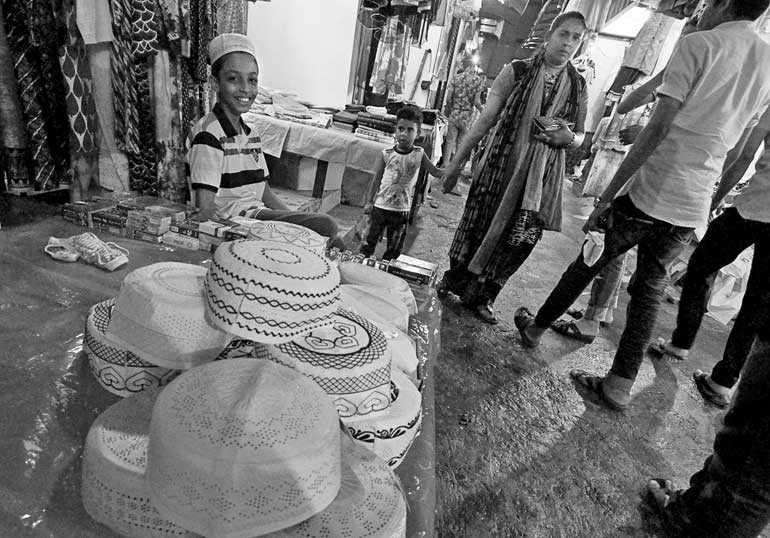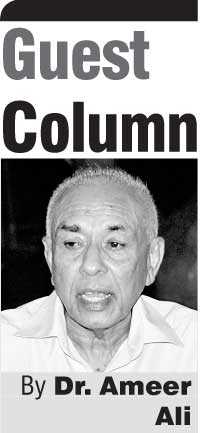Sunday Feb 22, 2026
Sunday Feb 22, 2026
Saturday, 17 August 2019 03:54 - - {{hitsCtrl.values.hits}}

In Sri Lanka, the current controversy regarding Muslim marriage and divorce, madrasa education, Muslim attire, halal food and so on clearly reflect this confrontation between tradition and modernity – Pic by Shehan Gunasekara
“For a better future, Muslims need a civil Islam that admits religious reform and
cultural change and helps people of the Islamic civilisation to accommodate to their international environments” – Bassam Tibi, ‘Islam’s Predicament with Modernity,’ London & New York: Routledge, 2009, p. 173
Whether Muslims live as minorities in non-Muslim countries or as majorities in a total of fifty seven countries, the clash of orthodoxy with modern challenges is a perennial issue that bedevils progress on several fronts in these communities. It is a historic battle and will continue for ever as long as orthodoxy remains obstinate and static while modernity continues to change and remain dynamic.
In politics, economics, education, law, culture, faith and in several other areas one could witness a constant clash in Muslim societies between traditionalists and their challengers. Even though such a clash is common to all societies, it is more acute among Muslims because bulk of their traditions is grounded in the Islamic faith. This is why Islamic orthodoxy is more formidable to breach than orthodoxies in other societies. Orthodoxy in Islam, which has a history of at least nine to 10 centuries, demands taqlid or unquestioning acceptance of what has already been stated or written, whereas modernity demands an ongoing process of ijtihad or independent reasoning in the light of advancing knowledge and an ever changing world. It is the dialectic tension between these two phenomena that characterise many faith-based issues in Muslim communities.
To resolve this tension society should encourage intellectual discursiveness, understanding, compromise and accommodation, which is not new to the Muslim world. In fact, if one could trace the history of Islam back to the period between 9th and 12th centuries, one would see how vibrant that world was in confronting and managing challenges arising especially from a group of rationalists called mu’tazilites, who questioned the very foundation of many of the prevailing faith-based traditions. 
Unfortunately, after this period traditionalists with political support succeeded in halting that vibrancy and made conformity to tradition the rule without exception. When religious orthodoxy allies with ruling political regimes as in Saudi Arabia for instance, heterodoxy is condemned as heresy and intellectual debates on religious issues are stymied.
In Sri Lanka, the current controversy regarding Muslim marriage and divorce, madrasa education, Muslim attire, halal food and so on clearly reflect this confrontation between tradition and modernity.
It appears that the Muslim community is becoming polarised between those who hold orthodoxy sacrosanct, as championed by members of the All Ceylon Jamiyyathul Ulema (ACJU) on the one hand, and a coalition of other groups such as secular intellectuals, professionals, writers and civil society leaders on the other, who want to make orthodoxy at least malleable.
One particular constituency that has entered this coalition are Muslim women who are agitating for their views to be heard in matters that affect their life directly. This coalition while remaining faithful to the core principles of Islam demand changes be made to manmade laws and regulations, which are defended by the conservatives in the name of guarding the shariah or divine law.
However, there is an understandable and fundamental fear among champions of orthodoxy, and that is, whether a relaxation now in certain areas would open the flood gates to further changes in other areas in the future and leading ultimately to a radical overturn of the core principles and values of Islam.
This was the same fear that haunted one of the most profound thinkers in the history of Islam, al-Ghazali (1058-1111), which compelled him to counter the mu’tazila rationalists of his time.
In the introduction to his criticism of rationalism and its philosophers, he wrote: “I have seen a group who, believing themselves in possession of a distinctiveness from companion and peer by virtue of a superior quick wit and intelligence, have rejected the Islamic duties regarding acts of worship, disdained religious rites pertaining to the effects of prayer and the avoidance of prohibited things, belittles the devotions and ordinances prescribed by the divine law, not halting in the face of its prohibitions and restrictions. On the contrary, they have entirely cast off the reins of religion through multifarious beliefs…” (Michael E. Marmura (Al-Ghazali, ‘The Incoherence of the Philosophers,’ Utah: Brigham Young University Press, 2000, p. 1-2). Al- Ghazali’s fear pervades the thinking of modern-day conservatives, which explains their resistance to change.
In spite of this fear, knowledge outside the religious realm is growing and will continue to grow until the end of humanity. The Quran and the acts and sayings of the Prophet never discouraged that growth, but encouraged and blessed it. Therefore, the challenges facing orthodoxy are those emanating from a confluence of multi-disciplinary knowledge that is, like the rationalists of yore, viewing truth from different perspectives. That confluence is unstoppable.
Reasoned knowledge demands reinterpretation of revelatory knowledge to keep pace with modernity. The task before the ACJU functionaries therefore, is to understand the nature of and the rationale behind that knowledge, and harness it to make revelatory knowledge dynamic and progressive.
There are more serious challenges the so-called guardians of shariah have to confront in future if they are aware of such challenges that are currently destabilising other religions already. Persistent obstruction to every challenge will only make future challenges become even harder to manage.
This management therefore requires a collective effort from learned men and women from different branches of knowledge to act as mediators between old and the new, and synthesisers of the best in both.
Condemning any new idea as bid’a (innovation) or heresy and to hurl fatwas against the originators of those ideas will only polarise the community. It is time ACJU includes ulama (I am using this term in the Quranic sense of knowledgeable people) from other disciplines apart from theology.
(The writer is attached to the School of Business and Governance, Murdoch University, Western Australia.)